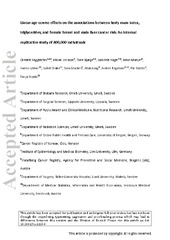Linear age-course effects on the associations between body mass index, triglycerides, and female breast and male liver cancer risk: An internal replication study of 800,000 individuals
Häggström, Christel; Jonsson, Håkan; Bjørge, Tone; Nagel, Gabriele; Manjer, Jonas; Ulmer, Hanno; Drake, Isabel; Ghaderi, Sara; Lang, Alois; Engeland, Anders; Stattin, Pär; Stocks, Tanja
Peer reviewed, Journal article
Accepted version
Permanent lenke
https://hdl.handle.net/1956/20231Utgivelsesdato
2020Metadata
Vis full innførselSamlinger
Originalversjon
https://doi.org/10.1002/ijc.32240Sammendrag
Apart from the consistently observed differential association between obesity and breast cancer risk by menopausal status, the associations between obesity and other metabolic imbalances with risks of cancers have not been systematically investigated across the age‐course. We created two random 50–50% cohorts from six European cohorts comprising 813,927 individuals. In the “discovery cohort”, we used Cox regression with attained age as time‐scale and tested interactions between body mass index (BMI), blood pressure, plasma glucose, triglycerides and cholesterol, and attained age in relation to cancer risk. Results with a p‐value below 0.05 were additionally tested in the “replication cohort” where a replicated result was considered evidence of a linear interaction with attained age. These findings were investigated by flexible parametric survival models for any age‐plateaus in their shape of associations with cancer risk across age. Consistent with other studies, BMI was negatively related to breast cancer risk (n cases = 11,723) among younger (premenopausal) women. However, the association remained negative for several years after menopause and, although gradually weakening over age, the association became positive only at 62 years of age. This linear and positive age‐interaction was also found for triglycerides and breast cancer, and for BMI and triglycerides in relation to liver cancer among men (n cases = 444). These findings are unlikely to be due to chance owing to the replication. The linear age‐interactions in breast cancer may suggest an influence by other age‐related factors than menopause; however, further investigation of age‐related effect modifiers in both breast and liver cancer is needed.
